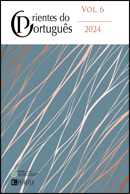Orientes - Aracne e a teia literária de Judith Teixeira (1880-1959)
Abstract
Considered by some to be the only woman in Portuguese modernism, Judith Teixeira manifests in her work, almost all written in the 1920s, an ethical exoticism and a red chromaticism (red is the most auspicious color in China) that make her writer, on this journey to the depths of self-knowledge, a case of literary brilliance and orientalist evasion.
Now it is the mythological fable of Arachne that seems to apply to Judith Teixeira's journey: from poetic boldness to banishment, from near death to resurrection, it is fair that the Portuguese writer's asceticism incorporates an orientation that shows that the reasons and characteristics of difference orientalist forms a symbol of literary effectiveness and novelty.
Finally, the aim is to fulfill the objective of unveiling the biobibliographical trajectory of a name that, despite the path taken, is important to expand and subject to new contributions and other readings
Downloads
Published
Issue
Section
License
Copyright (c) 2024 Martim de Gouveia e Sousa

This work is licensed under a Creative Commons Attribution 4.0 International License.


